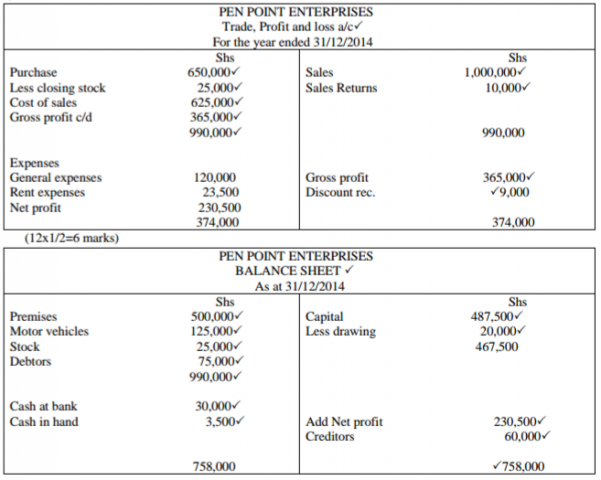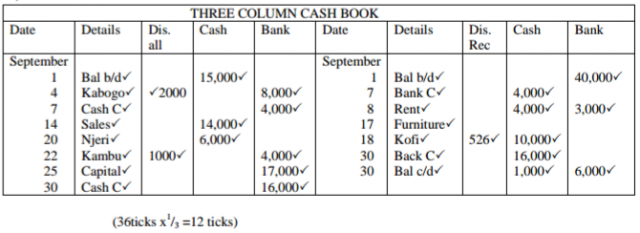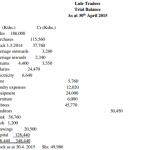KNEC KCSE Business Studies Paper 2 Question Paper / 2015 KCSE Tharaka South Joint Examination
BUSINESS STUDIES PAPER 2 QUESTION PAPER
2015 KCSE Tharaka South Joint Examination
Business Studies Paper 2
(a) Explain five problems encountered when calculating consumer price indices. (10 marks)
(b) Explain five principles under which cooperative societies should be managed. (10 marks)
20 marks
The following is the trial balance for Pen Point Enterprises as at 31/12/2014
Pen Point Enterprises
Trial balance as at 31/12/2014
Dr. Cr
shs. Shs.
Sales 1,000,000
Sales returns 10,000
Premises 500,000
Purchases 650,000
Discount received 9,000
Motor vehicle 125,000
Creditors 60,000
Capital 487,500
General expenses 120,000
Drawings 20,000
Cash at bank 30,000
Debtors 75,000
Rent expenses 23,500
Cash in hand 3,000
1,556,500 1,556,500
Stock at 31/12/2014 was valued at sh.25, 000
Prepare:
i) Trading, profit and loss account. (6 marks)
ii) Balance sheet. (6 marks)
(b) Explain four features of monopoly as a form of product market. (8 marks)
20 marks
(a) Explain five factors than an entrepreneur would consider when evaluating a business idea. (10 marks)
(b) Explain five factors that should be considered when choosing means of communication. (10 marks)
20 marks
(a) Explain five circumstances under which a high population growth may be desirable to a country. (10 marks)
(b) Explain five circumstances under which a wholesaler becomes essential in the chain. (10 marks)
20 marks
(a) Explain five advantages of buying goods from a departmental store. (10 marks)
(b) Explain five problems encountered in development planning in Kenya. (10 marks)
20 marks
(a) On 1st
September 2010,Hamisi Traders had sh.15,000 cash at hand and a bank overdraft of sh.40,000.
During the month the following transactions took place:
September
4 Kabogo,a debtor settled his account of sh.10,000 by cheque of sh.8,000
7 Deposited sh.400 into the business bank account from the cash till
8 Paid rent by cash sh.4, 000
14 Cash sales sh.14, 000
17 Purchased furniture worth sh.3, 000 paying by cheque
18 Settled Kofi’s account sh.10, 000 after being allowed a discount of 5%
20 Received sh.6000 cash from Njeri,a debtor
22 Kambu,a debtor settled his sh.4000 account by cheque, having been allowed 20% discount
25 Deposited sh.17, 000 into the bank from private sources
30 Banked the available cash except sh.1, 000
Required:
(a) Prepare a duly balanced three column cash book. (12 marks)
(b) Explain four reasons that make international trade more difficult to conduct than home trade. (8 marks)
20 marks
BUSINESS STUDIES PAPER 2 MARKING SCHEME
2015 KCSE Tharaka South Joint Examination
Business Studies Paper 2
a) Problems in calculating the price indices
− Difficult to determine what should constitute the ‘basket’ as commodities selected are those consumed by average
consumers.
− Difficult to determine a typical family or household as average consumers are preferred.
− Determining prices as they differ from one location to another.
− Selection of base year as it is difficult to get a fairly stable one.
− Difficult to ensure that correct weights are allocated to every item.
− Lack of adequate and accurate data on prices and consumer’ expenditure.
− Changing tastes and preferences of consumer which change their expenditure patterns (5×2=10marks)
b) Principles under which co-operative societies are managed.
− Democratic administration-one man one vote
− Co-operation with cooperatives-who are carrying out cooperative activities.
− Promotion of education to members turn seminars, workshops
− Provision of dividends to members from the profits realized.
− Voluntary open membership where members are free to join or leave the society.
− Limited interest on capital to members to participate. (any 5×2=10 marks)
20 marks
a)
b) Features of monopoly
− There is only one seller/supplier for the entire market.
− The products supplied do not have close substitutes in the entire market
− Difficult for other firms/suppliers to enter the market due to restrictions.
− Price are fixed by suppliers as he has control of output.
− Price discrimination where supplier sell the same product at different prices to different consumers
− The demand curve steeply is the same as that of the industry as monopolist is both the firm and the industry.
− A monopolist may exploit the consumer by restricting output and selling at higher prices.
− A monopolist may produce low quality due to lack of competition. (any 4×2=8 marks)
20 marks
a) Evaluating a business idea.
− Profit to be earned in order to cover all operational expenses
− Technology to be used in producing the product
− Availability of market/demand which should be adequate
− Government policy/legal requirement which should be favorable.
− Channel of distribution to ensure the product is available in the market.
− Competition which should be fair
− Capital which should be adequate to start.
− Input/supplies which should be minimal
− Payback period which should be reasonable in relation to amounts invested. (any 5×2=10 marks)
b) Choice of means of communication
− Speed/urgency/time-more urgent message will require a faster means
− Cost/affordability-one will choose a means that will be affordable
− Secrecy/confidentiality-confidential messages require appropriate means
− Distance/destination short distances require simple means
− Evidence/reference/record-when required written methods should be chosen.
− Reliability-means used should ensure that message reaches its destination.
− Accuracy-method used should not distort the message.
− Impression/effectiveness –method used should meet the desired impression/effect.
− Recipient literacy/language/status of recipient.
− Availability-one should go for a means that is available.
− Lengthy/nature/detailed message-long message require written communication. (5×2=10 marks)
20 marks
a) High population growth being desirable
− Where there is need to increase market demand for goods/services.
− Where there is need to increase labour supply
− Where there is need to attract investors through increased consumption by high population.
− Where there is need to reap the benefits of specialization/division of labour.
− When there is need for technological advancement leading to high efficiency
− When there is need to use diverse talents leading to quality/quantity goods. (any 5×2=10 marks)
b) Circumstances under which a wholesaler becomes necessary.
− Where producer doesn’t have enough capital to set up a distribution points.
− Where producers can’t manage distribution outlets due to management problems/logistics.
− Where government policy requires that certain goods be distributed by middlemen
− Where producers lack transport mean-hence saving cost.
− Where the producer lacks storage for safety of goods/ to save storage cost.
− Where there is need to brand/prepare goods for sale to save cost.
− Where market is wide as producer may not be able to cover the whole market.
− Where there is need to advertising so as to save on cost. (any 5×2=10 marks)
20 marks
a) Benefits of buying goods from departmental store.
− Access to specialized goods from relevant shops department.
− Personal attention to customers as they have access to relevant staff
− Access to auxiliary/after sales services which may be readily available within the store.
− One can save time by shopping under one roof.
− Use of debit/credit cards relieving one bother of carrying cash.
− Access to new products /information which one may not be aware off.
− Prices are relatively low enabling one to save/buy more.
− One can access variety of goods under one roof. (any 5 x2=10 marks)
b) Problems encountered in development planning.
− Inadequate/inaccurate information which render development plans unreliable.
− Lack of capital/financial resources hamper implementation of a well laid out plan.
− Dependence on external resources/funding which fluctuate/may not be released.
− Existence of large private sector where the state does not have direct control.
− Failure to involve local people at grassroots result in lack of support/rejection.
− Over ambitious plans which are unrealistic/unattainable lead to abandoned projects.
− Natural calamities/in foreseen occurrences where funds are diverted from planned purpose to be used in combating the calamity.
− Transfer of inappropriate plan/use of imported models which end up failing.
− Lack of political will/support frustrates implementation efforts or bring it down.
− Lack of commitment/cooperation among the executing parties may bring it down.
− Political instability/insecurity which hampers efforts planning.
− Shortage of qualified man-power making the government to rely on expatriates who are not knowledgeable on local conditions. (5×2=10 marks)
20 marks
a)
b) Reasons why international trade is more difficult.
− There are laws and regulations which differ from one country to another.
− Lack of a uniform currency makes conversion of currency as requirements difficult
− Physical barriers separating countries lead to high transport costs.
− The possibility of using untrustworthy agents increases the risk involved.
− Long procedure and documentation complicate trade in some countries.
− There are sometimes difficulties in finding potential markets for goods in foreign countries.
Differences in languages may make communication difficult.
20 marks




